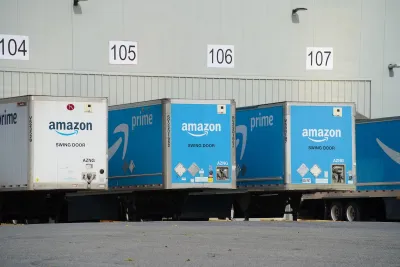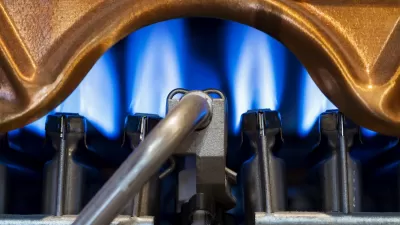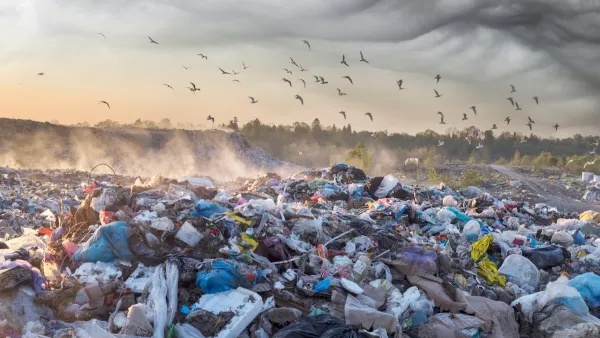The rise of ‘last-mile’ e-commerce warehouses — and their attendant truck traffic and air pollution — is disproportionately impacting the most historically disadvantaged parts of the city.

Air pollution from delivery trucks is impacting the health of New Yorkers, with an estimated 2,000 excess deaths per year attributed to long-term exposure to fine particulate matter, according to city data.
As Lauren Dalban reports in Inside Climate News, “The poorest neighborhoods often suffer the most in this equation—the PM2.5 levels from traffic are often higher in high-poverty neighborhoods, as well as the number of hospitalizations related to this pollutant.”
Dalban explains that the “last-mile warehouses” built for the distribution of e-commerce goods, which add to traffic and air pollution in surrounding areas, are often located in the poorest neighborhoods. Such warehouses can be built without a permit or environmental review in eight “commercial or manufacturing districts” around the city — many of which coincide with “environmental justice areas—places that have experienced a disproportionate amount of negative impacts from environmental issues due to historical disinvestment and social inequities.”
As part of an effort to redesign its trucking routes, New York City has launched a Commercial Cargo Bicycle Pilot Program and MicroHub program to encourage the use of smaller, low- or zero-emissions vehicles such as vans and cargo bikes for last-mile deliveries. According to Zach Miller of the Trucking Association of New York, “I think 80 percent of deliveries are happening to people’s homes right now in New York City, and that’s not what the truck route network was designed to do, so it is long past time to have this network be redesigned.”
FULL STORY: The Online Shopping Boom Comes at a Price—and Some New Yorkers Pay More Than Their Fair Share

Maui's Vacation Rental Debate Turns Ugly
Verbal attacks, misinformation campaigns and fistfights plague a high-stakes debate to convert thousands of vacation rentals into long-term housing.

Planetizen Federal Action Tracker
A weekly monitor of how Trump’s orders and actions are impacting planners and planning in America.

In Urban Planning, AI Prompting Could be the New Design Thinking
Creativity has long been key to great urban design. What if we see AI as our new creative partner?

King County Supportive Housing Program Offers Hope for Unhoused Residents
The county is taking a ‘Housing First’ approach that prioritizes getting people into housing, then offering wraparound supportive services.

Researchers Use AI to Get Clearer Picture of US Housing
Analysts are using artificial intelligence to supercharge their research by allowing them to comb through data faster. Though these AI tools can be error prone, they save time and housing researchers are optimistic about the future.

Making Shared Micromobility More Inclusive
Cities and shared mobility system operators can do more to include people with disabilities in planning and operations, per a new report.
Urban Design for Planners 1: Software Tools
This six-course series explores essential urban design concepts using open source software and equips planners with the tools they need to participate fully in the urban design process.
Planning for Universal Design
Learn the tools for implementing Universal Design in planning regulations.
planning NEXT
Appalachian Highlands Housing Partners
Gallatin County Department of Planning & Community Development
Mpact (founded as Rail~Volution)
City of Camden Redevelopment Agency
City of Astoria
City of Portland
City of Laramie




























